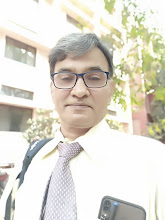Saturday, May 29, 2010
"Linked " by Albert-laszlo Barabasi
Linked
Author: Albert-Laszlo Barabasi
How many times have you met a stranger hundreds or thousands of miles away from your home, just to realise after a five-minute discussion that you have a common acquaintance? You say, “Small world...” But how is it that we’re so close to perfect strangers?
How is it possible to have a path of three to five handshakes to just about any of the six billion inhabitants of our crowded planet?
The answer lies in the fact that society is a very densely connected network in which we are nodes, and links represent our numerous social, professional, or family relationships. Recently, we’ve learned that the small worlds we experience in society are just about everywhere. Three years ago, my research group showed most web pages are 19 clicks from each other, and that between any two chemicals in our cells there is a chain of three reactions...
Economists have realised that all Fortune 1000 directors are fewer than five handshakes from each other through the boards on which they jointly serve. Yet, the most important revelation about networks — the one that is exciting scientists from all disciplines — has little to do with small worlds. Rather, it is the realisation that the networks appearing in all different segments of nature and society are indistinguishable.
We now understand that real networks are far from being a bunch of nodes randomly linked to each other. Instead, a few hubs, nodes with an exceptionally large number of connections, keep most networks together. A few individuals with an extraordinary ability to make friends keep society together.
Post Script : This book got 5 star rating on Amazon.com. Link here :
http://www.amazon.com/Linked-Everything-Connected-Else-Means/dp/0452284392/ref=sr_1_1?ie=UTF8&s=books&qid=1275157429&sr=1-1
Friday, May 28, 2010
Life Place - Bio-regionalism by Robert L.Thayer
Life Place
Posted on January 25, 2010 | Author: Robert L Thayer |
Somewhere in the swirl of life, each of us ponders three essential questions: “Who am I?” “Where am I?” and “What am I supposed to do?”
We often consider the first question in isolation, as if it were the true key to our existence — as if the matter of who we are could be resolved independently of the two remaining questions...We wander the postmodern landscape like hunter-gatherers, searching for bits and pieces of meaning, unconsciously emulating the atomised consumers of economists’ elaborate models. Governments and transnational corporations expect us to substitute a shallow awareness of the entire globe for whatever deep wisdom and affection we might have had for a specific place.
In the process of becoming postmodern, we have abandoned the notion of “home,” and like innocent natives presented with beads and trinkets of shining lustre and unfamiliar purpose, we have surrendered our former homelands to the new gods of consumerism, transience, shallow information, global communication, and eve rexpanding technology.
We are trained in schools and universities to “become” before we “locate.” The ends of these hopeless wanderings, in terms of both purpose and place, very often elude us. Our places and communities have been usurped by machines, sprawled out by the automobile, homogenised by consumer culture, seduced by the globalising economy, trivialised by TV, and disconnected from deep wisdom by the shallow superficiality of the “electronic superhighway.”
Excerpted from : "Life Place - a bio-regional thought and practice " by Robert L. Thayer.
Amazon review Link :
http://www.amazon.com/LifePlace-Bioregional-Robert-Thayer-Jr/dp/0520236289/ref=ntt_at_ep_dpi_1
